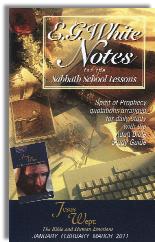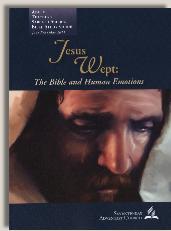|
||||||||||||||
Commentary on "Guilt""
Day 1: Sabbath Afternoon, January 22, 2011 - Introduction
Overview: (Teacher’s Quarterly, Page 55)
I. Know: Good for the Soul
- A healthy conscience alerts us to wrongs we have done. How can we cultivate a healthy conscience?
- What is the best way of relating to guilt over sin? What does God do for us when we confess our sins?
- What problems can occur when we don’t confess our sins?
- Why is it important to forgive others who sin against us?
II. Feel: Humility and Trust
- What feelings can get in the way of acknowledging our errors?
- What feelings should accompany confession?
- How do we feel when we accept God’s forgiveness?
III. Do: Abundant Life
- What sins do we need to confess?
- Once we have confessed our sins, what has God done for us that we need to contemplate, appreciate, and accept?
- What would it take for us to live a free, joyful life in Christ this week? How can we share news of this freedom with others?
Problems
“But when the sense of guilt is justified, it serves as a good conscience. Guilt produces enough discomfort to make the person do something about it.” (Teacher’s Quarterly, Page 53)
Compare this quotation and the summary above with Colossians 1:13-14 – “For He rescued us from the domain of darkness, and transferred us to the kingdom of His beloved Son, in whom we have redemption, the forgiveness of sins.”
Do you see the difference? This lesson is all about guilt and seeks to arrive at a proper response to it. The lesson deals with guilt from the standpoint of sinful behavior and the need to GET forgiveness.
By contrast, Paul clearly told the Colossians (and us) that we already HAVE forgiveness. This forgiveness that we already have is found in Christ. Therefore, if you are in Christ, you are a forgiven person. In addition, if you are in Christ you have been rescued from the domain of darkness and transferred to Jesus’ kingdom.
The lesson’s approach yields a focus on feelings instead of faith. Consider this question from one of the teacher preparation sections: “ ‘Catholic guilt’; ‘Jewish guilt’; ‘Adventist guilt.’ What’s behind the popular idea that those raised within strong faith communities, with high moral expectations, will inevitably live their lives wracked with guilt?” (Teacher’s Quarterly, Page 61) The answer is that the three religions mentioned are not “strong faith communities.” They are strong performance-above-all-else communities, and, in fact, they are filled with hypocrisy, not high moral expectations.
Treating guilt as an emotion instead of a very real fact removes God from the equation and lays nearly all responsibility for assuaging the emotion at my feet. In fact, as we’ll see later in the lesson, putting the onus for dealing with guilt on humans requires God to respond to us. This may be the worst result of all, because it diminishes the very Savior who provides forgiveness and life in the first place.
Summary
- This entire lesson is an exercise in futility. Its entire focus is on feelings, not fact. Its only solution is human effort, not God’s grace. Its only result will be more guilt, not the peace we’ve been granted as children of God.
- On the other hand, if we stop relying on and reacting to our emotions, if we accept by faith the clear teaching under the New Covenant that God’s children are forgiven people, if we learn to live in the reality of our future hope guaranteed by Jesus Himself, then we will be able to gladly admit our failings, to God and to each other, and offer the same forgiveness to others that we’ve already received in Jesus.
Copyright 2011 BibleStudiesForAdventists.com. All rights reserved. Revised January 18, 2011. This website is published by Life Assurance Ministries, Glendale, Arizona, USA, the publisher of Proclamation! Magazine. Contact email: BibleStudiesForAdventists@gmail.com.
The Sabbath School Bible Study Guide and the corresponding E.G. White Notes are published by Pacific Press Publishing Association, which is owned and operated by the Seventh-day Adventist church. The current quarter's editions are pictured above.
Official Adventist Resources
Standard Edition Study Guide Week 5
Teacher's Edition Study Guide Week 5


